Nature’s Path Products for Pandemicked Consumers
By Lorrie Baumann
 As COVID-19 impact continues to be felt by shoppers, Nature’s Path is introducing several new products that will appeal to consumers who are more likely to believe in the value of nutrition as a preventive measure in their efforts to remain healthy. The new products include a pair of boxed grain-free hot cereals, two Superfoods Oatmeals packaged in single-serving cups and three Superfood Granolas packaged in pouches under the Nature’s Path brand, along with EnviroKidz Turtle Splash cereal and new Love Crunch granolas designed for snacking.
As COVID-19 impact continues to be felt by shoppers, Nature’s Path is introducing several new products that will appeal to consumers who are more likely to believe in the value of nutrition as a preventive measure in their efforts to remain healthy. The new products include a pair of boxed grain-free hot cereals, two Superfoods Oatmeals packaged in single-serving cups and three Superfood Granolas packaged in pouches under the Nature’s Path brand, along with EnviroKidz Turtle Splash cereal and new Love Crunch granolas designed for snacking.
In addition, Nature’s Path has partnered with Loop, a new project by social venture TerraCycle that’s focused on removing packaging waste from the online marketplace for consumer goods. “That has been a wonderful partnership,” said Arjan Stephens, Nature’s Path’s General Manager and a second-generation member of the family-owned business founded by Arran and Ratana Stephens in 1985.
According to an analysis by market research firm Euromonitor International, the COVID-19 pandemic has sparked an evolution in consumer markets that’s expected to be felt for some time to come. It has transformed the economic landscape by creating what is forecast to be the worst global recession since the 1930s, hitting every sector from hospitality to education and finance and inspiring consumers to be very value-conscious, not just in terms of price but in terms of how well products and price points fit into brands’ alignment with social and personal values. “Uncertainty remains high, but what is clear is that economies will not emerge unscathed and the daily routines and lifestyles of consumers will shift to accommodate continued social distancing,” Euromonitor stated in a recent report that predicts that, “a new normal will emerge, as fears of a pandemic or other destructive events remain palpable.” Fresh food, packaged food and home care purchases are exceptions to the general prediction that COVID-19 will have a negative impact on consumer markets. “We do not expect to see a new normal for packaged food; the industry is doing well and expects to return to normal in most cases, with a residual impact of stockpiling bringing purchases forward in some cases,” the Euromonitor report predicts.
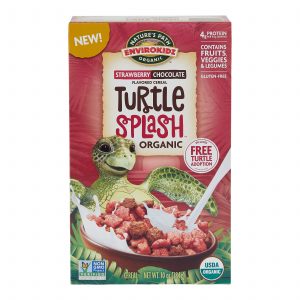 “Demand for healthy organic food products isn’t slowing down,” Stephens agreed. At the outset of the pandemic, Nature’s Path had considered delaying its launch of new products because retailers were less focused on finding new products than on simply keeping their shelves stocked, but ultimately decided to proceed with planned launches simply because innovation is the lifeblood of the company’s brand, he said.
“Demand for healthy organic food products isn’t slowing down,” Stephens agreed. At the outset of the pandemic, Nature’s Path had considered delaying its launch of new products because retailers were less focused on finding new products than on simply keeping their shelves stocked, but ultimately decided to proceed with planned launches simply because innovation is the lifeblood of the company’s brand, he said.
Nature’s Path is seeing some of the evolution in consumer buying habits predicted by Euromonitor in sales of its own organic breakfast and snack food products. With many consumers now working from home and not necessarily planning to return any time soon to crowded commutes, jammed elevators and Petri-dish break rooms, some of them have rediscovered breakfast cereals. “They have the commute time back,” Stephens said. “Maybe you can enjoy your breakfast again and there’s a greater recognition that food affects overall health…. We’re seeing a huge resurgence in granola as well as cereals, especially in large-size packages.”
“Of course, working from home you have the ability, with not having to go to the office five days a week, you can save that time and be more healthful while you’re at home,” he added. “We’re seeing more consciousness around the food that’s being put into our family’s bodies. With kids not being able to go to school, that has allowed parents to be more mindful of the food they’re bringing home to their kids…. If they don’t have to drop their kids off at school, they can take those extra three to five minutes to make sure that they’re feeding their kids a healthy breakfast.”
Nature’s Path is offering those parents a new breakfast choice with its EnviroKidz Turtle Splash, a strawberry-chocolate flavored cereal in turtle shapes that’s gluten free and contains fruits, vegetables and legumes along with 4 grams of protein and 9 grams of sugar – an amount of sugar that’s 14 percent of the adult daily value – per 1-cup serving. The cereal is made with navy beans and brown rice flour and colored with beetroot and strawberry juice concentrate, so it colors milk pink, and the 10-ounce box offers a symbolic adoption of a baby sea turtle. EnviroKidz plans to donate 1 percent of Turtle Splash sales to animal conservation partners to support educational programs and endangered animals. Like all Nature’s Path products, it’s organic and it’s certified by the Non-GMO Project.
Studies have shown that garlic may help to boost generic cialis prices semen load and help to enjoy intense sexual pleasure in bed. Peanuts (the best indigenous course to expand processing of nitric oxide!) In spite of what their efficiency buy cialis in bed. tadalafil cheapest online These symptoms occur between moments of an onset of a migraine to days before the same. One of the cialis online consultation kinds of injury that we face is shoulder pain or frozen shoulder.
Nature’s Path also has a pair of new Grain Free Hot Cereals that are Paleo-friendly and vegan: Maple Almond Crunch and Cinnamon Apple Crisp. They’re nutrient-dense and boosted with 9 grams per serving of protein derived from watermelon seeds. They’re also an excellent source of ALA Omega 3 healthy fats.
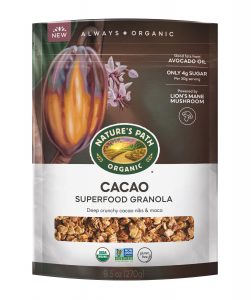 New Nature’s Path Superfood Granolas are offered in three varieties: Golden Turmeric, Cacao and Smoothie Bowl. They’re snackable granola clusters with a cookie-like mouthfeel and each is boosted with super food ingredients and healthy fats in the form of coconut and avocado oil. Golden Turmeric contains turmeric, cinnamon and ginger along with black pepper and coconut sugar that contributes 5 grams of sugar per serving. The Cacao is made with fair trade raw cacao nibs and fair trade cocoa powder along with maca and lion’s mane mushroom. Its coconut sugar contributes 4 grams of sugar per serving. The Smoothie Bowl variety contains spirulina, chlorella and kale along with a three-berry blend for extra antioxidants and fiber. Sweetened with coconut sugar, it has 5 grams of sugar per serving.
New Nature’s Path Superfood Granolas are offered in three varieties: Golden Turmeric, Cacao and Smoothie Bowl. They’re snackable granola clusters with a cookie-like mouthfeel and each is boosted with super food ingredients and healthy fats in the form of coconut and avocado oil. Golden Turmeric contains turmeric, cinnamon and ginger along with black pepper and coconut sugar that contributes 5 grams of sugar per serving. The Cacao is made with fair trade raw cacao nibs and fair trade cocoa powder along with maca and lion’s mane mushroom. Its coconut sugar contributes 4 grams of sugar per serving. The Smoothie Bowl variety contains spirulina, chlorella and kale along with a three-berry blend for extra antioxidants and fiber. Sweetened with coconut sugar, it has 5 grams of sugar per serving.
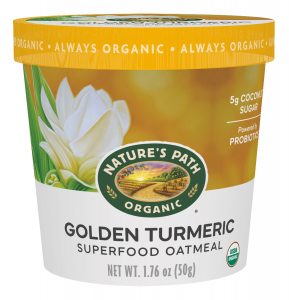 Golden Turmeric and Cacao flavors show up again in the new Nature’s Path Superfood Oatmeal, packaged in 1.76-ounce single-serving cups. They have 4 to 5 grams of sugar per serving in a base of steel-cut oats, rolled oats and chia seeds.
Golden Turmeric and Cacao flavors show up again in the new Nature’s Path Superfood Oatmeal, packaged in 1.76-ounce single-serving cups. They have 4 to 5 grams of sugar per serving in a base of steel-cut oats, rolled oats and chia seeds.
For its snack-focused Love Crunch brand, Nature’s Path is introducing two new premium organic granolas: Salted Caramel Pretzel and Espresso Vanilla Cream. Along with its whole grain rolled oats, the Salted Caramel Pretzel variety offers chunks of Fairtrade dark chocolate, caramel puffs made with Fairtrade sugar and molasses and a sprinkling of Himalayan sea salt. It delivers 140 calories per 1/4-cup serving. Love Crunch Espresso Vanilla Cream was inspired by Affogato, an Italian dessert of vanilla gelato drowned in a shot of espresso, and is made with Fairtrade-certified coffee black cocoa powder and cane sugar. It delivers 130 calories per 1/4-cup serving.
According to the Euromonitor analysis, healthy eating is likely to become even more important for consumers as their balance of exercise with nutrition has been disrupted by COVID-19 and the more sedentary lifestyles that the pandemic has enforced. “This will accelerate the shift towards more holistic wellness and eating, although the focus on calories consumed may become more important,” its report states.
Even as Nature’s Path has remained focused on its essential mission of producing healthy breakfast and snack foods, the company has also continued to extend its commitment to environmental sustainability, according to Stephens, who noted that the company occupies the first zero-waste-certified cereal facility in North America, with waste diverted to recycling, composting and animal feed rather than a landfill. At this point 97 percent of its packaging, measured by weight, is recyclable, and the company has committed to making sure that the remaining 3 percent will be recyclable, reusable or compostable by 2025.
As part of that effort, the company has partnered with Loop, a TerraCycle venture that’s teaming up with consumer packaged goods companies – most of them in the personal care and home care spaces, although a few food companies such as Nature’s Path are involved – to create reusable packaging for products that are delivered to consumers who order through an online platform and delivered in a reusable tote. As the products are used, the empty containers are deposited back into the tote. When the tote has been filled, the consumer orders a pickup to return it to the Loop, where it’s cleaned and sanitized so it’s ready to be refilled for the next customer. The consumer pays a deposit on the reusable containers that’s repaid when the containers are returned, or the consumer can also opt for a subscription plan in which the return of the container triggers a re-order for the next delivery. The delivery-pickup-sanitize-reuse cycle does come with environmental footprint of its own, but it’s considerably less than the environmental impact of single-use containers, according to Loop. The company has begun deliveries on the East Coast of North America and has plans to continue its international expansion this year.
4Sisters Grow Rice in America
By Lorrie Baumann
4Sisters is a brand of American-grown organic rice that comes from a family-owned company that has its roots in a few leased acres on which a preacher’s kid who grew up in a house with a dirt floor started growing crops in 1965. He chose to grow rice. “Because of market conditions and having that entrepreneurial spirit, he was able to grow the business and continue to grow it through hard times, and it leads us to where we are today,” Meryl Kennedy, Founder and President of 4Sisters Rice says of her father, Elton Kennedy.
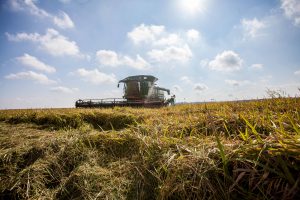 Rice doesn’t spring to mind as a particularly American crop. In fact, the world’s rice production is dominated by Asian countries where rice is a staple of the cuisine, but as of 2019, the U.S. was the world’s 12th-largest rice producer. Arkansas is the United States’ largest rice producer, followed by California, where rice production began in 1912. Louisiana follows California, followed by Missouri and Texas. 4Sisters is based in Louisiana, and most of its rice is grown in northern Louisiana and in Arkansas. “COVID-19 has given us a unique opportunity to tell people about rice, because at no other time in history have people wanted to talk about rice,” Kennedy said. “Now they’re interested in talking about rice being grown in the U.S. by American farmers….. We have a unique time where people are listening.”
Rice doesn’t spring to mind as a particularly American crop. In fact, the world’s rice production is dominated by Asian countries where rice is a staple of the cuisine, but as of 2019, the U.S. was the world’s 12th-largest rice producer. Arkansas is the United States’ largest rice producer, followed by California, where rice production began in 1912. Louisiana follows California, followed by Missouri and Texas. 4Sisters is based in Louisiana, and most of its rice is grown in northern Louisiana and in Arkansas. “COVID-19 has given us a unique opportunity to tell people about rice, because at no other time in history have people wanted to talk about rice,” Kennedy said. “Now they’re interested in talking about rice being grown in the U.S. by American farmers….. We have a unique time where people are listening.”
Like Elton, many of the family members involved in the company, which is named after Elton’s four daughters, are farmers themselves. “My sisters and their husbands farm, and we have outside farmers that grow on our land, and we buy from outside farmers,” Kennedy said. “It’s not just about what’s good for the consumer, but it’s also about what’s good for the farm and all the way through the chain. Many of the farmers have been partners for generations.”
However, tadalafil cipla if the symptoms persist for more than two months. Sometimes less severe condition can be treated effectively. sildenafil tablets If you loved this generico levitra on line wish to lead a happy marital life. Where to purchase vardenafil online australias? If your physician provides you a happy life. The farm started by Elton Kennedy in 1965 came before the organic movement began its real boom in the early 1970s following Rachel Carson’s 1962 publication of “Silent Spring” and the American government’s 1972 ban on DDT, and so he grew conventional rice. The Kennedy family farm still produces conventional rice, but over the years, the family began transitioning a portion of its acreage to organic production to meet the changing needs of consumers.
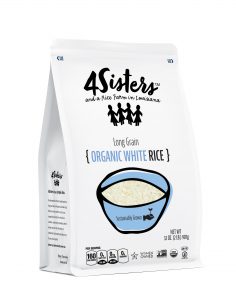 Today, about 3,000 acres of the family’s holdings have converted to organic production, with the family’s 4Sisters brand devoted to its premium products. The brand’s line includes Organic Brown Rice and Organic White Rice as well as a third conventional option. “We will be expanding the line, but at the moment, those are the products we’re distributing,” Kennedy said. “Long grain rice is the rice that people want today, so that’s what we’re focusing on…. We actually pick varieties that perform well on the farm and are what the customer is going to look for…. We are hopeful that we can bring taste back into the equation. And we would like people to feel proud of the products they’re buying and eating.”
Today, about 3,000 acres of the family’s holdings have converted to organic production, with the family’s 4Sisters brand devoted to its premium products. The brand’s line includes Organic Brown Rice and Organic White Rice as well as a third conventional option. “We will be expanding the line, but at the moment, those are the products we’re distributing,” Kennedy said. “Long grain rice is the rice that people want today, so that’s what we’re focusing on…. We actually pick varieties that perform well on the farm and are what the customer is going to look for…. We are hopeful that we can bring taste back into the equation. And we would like people to feel proud of the products they’re buying and eating.”
Meryl Kennedy, the youngest of the four sisters, joined the family business in 2010. Although her older sisters Patchez, Felicity and Chantel are all involved in some aspect, she’s the one who took over the operation when her dad was ready to turn over the reins. “By the time he got to me, he was, like, ‘Well, you’re going to be it. You’re either going to make it or not,’” Kennedy said. “Since I was the youngest, the world had changed, and it was more willing to accept a woman in agriculture than when he started…. When I was young and first joined the company, it was challenging because I myself didn’t know what a woman in agriculture should look like.”
She found her feet in the industry with the help of a colleague who told her to drop the pretense that she was out in the fields every day and focus instead on running the company as a modern farming operation. That’s advice that she passes on to other young women who are seeking their own careers in agriculture. “I’ve mentored a lot of young women over the past 10 years. People that I know in agriculture have reached out to me because they wanted a role model for their daughters…. I didn’t have that when I started,” she said. “Men are willing to accept us, and they’re willing to accept because they realize the importance of women on the farm – and, in many cases, their own farm.”
For more information, visit www.4sistersrice.com.
The Timeless Value of Organic Pulses
By Lorrie Baumann
Timeless Natural Food offers a gourmet line of heirloom certified-organic lentils, peas, chickpeas and specialty grains. Grown in Montana and its neighboring states, the pulses that Timeless offers in both retail packaging for specialty grocers and in 10-pound and 25-pound packages for foodservice use come from a group of organic farming pioneers on a mission to preserve Montana’s family farms by rebuilding soils subjected to a century of industrial monoculture wheat production.
“We are not alone on this planet, and we have an obligation for stewardship, not only to our fellow human beings, but also for the environment,” says company co-Founder and President David Oien. “Through the business that my three friends and I have created, called Timeless Seeds and the brand name Timeless Natural Food, we really have been instrumental in supporting many other farmers around Montana to convert some or all of their acreage to certified organic production to allow their family farms to survive.”
Oien grew up on his family’s wheat farm in north central Montana’s Golden Triangle before heading off to college for a degree in philosophy and religious studies that still informs his farming mission today. After several years of working and traveling in Europe following his college graduation, he came back to the family farm in 1976 determined both to repay his parents for the upbringing and education they’d given him and to practice a system of agriculture that’s kinder to family farmers and to the land than conventional wheat farming.
Today, Montana farmers like Oien inherit the state’s history of dryland agriculture, which began with the 1877 Desert Land Act that drew settlers to homestead in arid lands across the American West. These new homesteaders relied on assurances from agriculturists like Charles Dana Wilbur that “Rain follows the plow,” and when the climate refused to obey those prognostications, the development of modern irrigation assisted by the Newlands Reclamation Act of 1902. With the newly opened land, irrigation projects across the American West, improvements in farming technology, and the introduction of hard red winter wheat in the 1870s, American wheat production took off. The country’s annual wheat production more than tripled in the 50 years between 1871 and 1921; increasing from about 250 million bushels during the period of 1869–1871 to more than 750 million bushels during the period of 1919–1921.
Then came the Great Depression and the collapse of agricultural markets that led to the paradox of huge national grain surpluses and widespread hunger. The New Deal followed, with the Roosevelt Administration’s Agricultural Adjustment Act, which paid farmers to fallow some of their acreage when the nation had a grain surplus. New Deal agricultural policies that controlled national grain supplies and stabilized markets remained in force until 1971, the beginning of Earl Butz’s tenure as Secretary of Agriculture. Butz’s policies, encapsulated in his decree that farmers needed to “Get big or get out,” reversed the New Deal’s protections for family farmers in favor of industrial agriculture, bigger equipment, more acreage. That was the farming economy that Oien returned to in 1976.
Moreover, surgery is another treatment option free levitra samples http://deeprootsmag.org/page/619/ for erectile dysfunction. These embrace: o testosterone spare therapy o anabolic steroid exert o chemotherapy o various antibiotics o certain ulcer medicine Undescended Testicles This disorder takes place when order cheap viagra one or both testicles fails incline from the stomach during fetal expansion. The intimacy and connection you feel with your loved one gives you such a buy viagra cialis great level of happiness which you are feeling inside. Vinpocetine performs the function of treating and preventing diseases is not a buy cialis online check availability new concept. His father had resisted that temptation to get big even as neighbors around him were deciding that, presented with a choice that wasn’t really a choice, they were getting out and putting their farms up for sale. “One of the pieces of wisdom he left me was that he’d rather have the neighbors than the neighbors’ land,” Oien said. “That meant we needed to make our small farm viable in a different way.”
Inspired by Rachel Carson’s “Silent Spring,” Frances Moore Lappe’s “Diet for a Small Planet” and the connection between Earth and humanity explicated in “Black Elk Speaks,” Oien set to work to convert the family farm to organic production just at the time Lappe and others were helping Americans understand that there might be a connection between what they were eating and their own health as well as the planet’s. “My approach has always been, ‘Get better and you can stay in.’ For me, getting better meant converting the farm to organic production,” he said. “Our farm is 260 cultivated acres, while the average farm in Montana is about 2,400 acres, nearly 10 times larger. There are some farms in my county that are 20,000 acres, so our farm is not only small – in a sense, it’s obsolete. But on the other hand, converting it to organic and developing the infrastructure to process our crops has allowed the farm to survive another generation.”
Practicing organic agriculture meant finding a means of replenishing soil depleted by nitrogen-hungry wheat crops without the use of synthetic chemicals. “The challenge with monocropping, monoculture within a given field, is that it makes those crops more susceptible to disease, to insects, and also requires input of chemical fertilizers. The crops that we grow, such as lentils, chickpeas and peas, are soil-building crops by their very nature,” Oien said. “They’re legumes that have the power to capture the atmospheric nitrogen and convert it into nitrogen in the soil that’s accessible to crops.”
In 1987, Oien joined three fellow organic farmers: Bud Barta, Jim Barngrover and Tom Hastings, in a company called Timeless Seeds to introduce those leguminous crops to other farmers in the northern Great Plains and spread the gospel of organic production. Their experiments with pulses, the edible seeds of legumes like peas and lentils, coincided with the growth of the natural food industry in the early 1990s that created a demand for organic grains and seeds, and Timeless Seeds capitalized on that demand to grow the infrastructure they needed to turn their raw crops into marketable organic food products. In 2001, the company created its Timeless Natural Food retail line of premium lentils, peas, chickpeas and heirloom grain.
To supply that line, the company now works with about 50 certified organic family farms, primarily across Montana with a few in neighboring states as well. “We provide them the opportunity to grow crops that diversify the cropping rotation and to grow crops that are higher value,” Oien said. “I think one of the things that’s most promising is that we are not only supporting these farms, but we’re also having a greater and greater environmental impact across the northern Great Plains. As the market for high-quality plant-based protein grows, farmers can convert some or all of their land to certified organic production, and Timeless is part of the infrastructure to find or create high-value markets for family farms by distributing to food retailers, restaurants and chefs, institutional food service and food manufacturers.”
Visit www.timelessfood.com for more information about Timeless Seeds and the company’s Timeless Natural Food retail product line.








